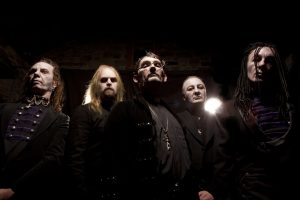
Formed in 1982, HELL were the ultimate ‘could’ve been’ band, until their biggest fan plucked them from obscurity and put them back where they belonged – on stage and on top of their game. LOUISE BROWN speaks to KEVIN BOWER and ANDY SNEAP about triumphing over the curses and disappointing chapters of their career
When we started Iron Fist, the idea behind the ‘Under The Influence’ series was to celebrate the bands that changed the face of extreme music and inspired countless new metal maniacs to pick up a guitar and raise fucking hell; Sodom, Incantation, Raven, Emperor etc. But this issue’s feature is different. Different in that Hell never really made the impact that should have when they first began in 1982. Misfortune and mis-timing resigned the Midlands-based four-piece to the depths of obscurity and despite being groundbreaking and pioneering for their time were stuck between that NWOBHM heyday and the mid to late ‘80s when heavy metal really started to get exciting. By 1987 the band had imploded and they watched as newer bands did what they had been doing for years in terms of theatrics and musical experimentation.
However, while their name vanished from the heavy metal hallowed halls, bar a few tape-traders and underground connoisseurs, they remained a strong influence on one person. It just so happened that that one person was Andy Sneap, producer of countless bands from coverstars Carcass to Exodus to Cathedral and guitarist for the mighty Sabbat. Being a huge part of his formative life and even being taught guitar by axeman, the late Dave Halliday, Hell remained such an inspiration to him that they never left his mind and thanks to the internet was finally able to track down the members of the band that had inspired him so much.
Once Hell were reunited thanks to Andy’s staunch focus and dedication it wasn’t long before the elders were re-learning their instruments and playing together again. It’s a story of highs and lows and, ultimately, a passion for Sneap’s first favourite metal band that never waned and a desire to make right what should have been done years ago for the original Hell musicians. It’s a story that needs to be told.
It’s also a story of triumph.
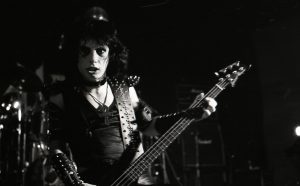 As previously mentioned, the Hell demos and sole single ‘Save Us From Those Who Would Save Us’ were beyond obscure. Only the real underground elite would talk about the band in hushed, reverent tones, to the rest they were a mystery. But when it was announced in 2011 that the band were to return, with Andy Sneap on guitars and original guitarist and founding member Kevin Bower’s brother David on vocals, there was a buzz of excitement. The demos were quickly unearthed and spread like wildfire and people finally started to pay tribute to one of Britain’s most eccentric and ingenious heavy metal bands. I remember Jaap Wagemaker from Nuclear Blast being particularly excited, being one of the few who knew the band and those now infamous-demos, and as soon as it was revealed that Hell were entering Sneap’s studio to re-record their old songs and release an album, ‘Human Remains’, it was no surprise that it would be released on the German powerhouse. But May 2011 was when Hell really came alive. Playing a comeback show at the MFN Club in Nottingham, the band showed that they were back and meant business, with a live show that echoed their past. See, Hell were never a band to do things by halves, even back in 1982, when they played they performed, they put on a show and that meant costumes, corpse paint, pyrotechnics and theatrics. Their comeback was no different and now helmed by acting professional David Bower meant they could re-live their past and add to their childhood ambitions of putting on a show to end all shows. It was the difference between another retro band doing a half-assed reunion on the back of an interest in the heavy metal of old and a band coming back all guns blazing. And it granted the band a crossover appeal that would take them above and beyond all expectations, beyond the underground circles usually afforded the majority of rejuvenated ‘80s metal bands and put them where they should have been all along, hailed as one of the best British metal bands… ever. Invited to open for Carcass and Amon Amarth on their recent European trek, the band put on a storming show, despite it being a stripped down version of their full-on display seen earlier this year at Bloodstock, and later decamped to their dressing room to give Iron Fist a full history of the band… past, present and future
As previously mentioned, the Hell demos and sole single ‘Save Us From Those Who Would Save Us’ were beyond obscure. Only the real underground elite would talk about the band in hushed, reverent tones, to the rest they were a mystery. But when it was announced in 2011 that the band were to return, with Andy Sneap on guitars and original guitarist and founding member Kevin Bower’s brother David on vocals, there was a buzz of excitement. The demos were quickly unearthed and spread like wildfire and people finally started to pay tribute to one of Britain’s most eccentric and ingenious heavy metal bands. I remember Jaap Wagemaker from Nuclear Blast being particularly excited, being one of the few who knew the band and those now infamous-demos, and as soon as it was revealed that Hell were entering Sneap’s studio to re-record their old songs and release an album, ‘Human Remains’, it was no surprise that it would be released on the German powerhouse. But May 2011 was when Hell really came alive. Playing a comeback show at the MFN Club in Nottingham, the band showed that they were back and meant business, with a live show that echoed their past. See, Hell were never a band to do things by halves, even back in 1982, when they played they performed, they put on a show and that meant costumes, corpse paint, pyrotechnics and theatrics. Their comeback was no different and now helmed by acting professional David Bower meant they could re-live their past and add to their childhood ambitions of putting on a show to end all shows. It was the difference between another retro band doing a half-assed reunion on the back of an interest in the heavy metal of old and a band coming back all guns blazing. And it granted the band a crossover appeal that would take them above and beyond all expectations, beyond the underground circles usually afforded the majority of rejuvenated ‘80s metal bands and put them where they should have been all along, hailed as one of the best British metal bands… ever. Invited to open for Carcass and Amon Amarth on their recent European trek, the band put on a storming show, despite it being a stripped down version of their full-on display seen earlier this year at Bloodstock, and later decamped to their dressing room to give Iron Fist a full history of the band… past, present and future
When Hell first came back together in 2008, Iron Fist didn’t exist, and although most of us now know how you came to be reunited, please tell us again about your reformation?
Andy Sneap: “It was really a case of getting Tim [Bowler, drums], Tony [Speakman, bass] and Kev together as old friends originally – we all knew each other from back in the day and it was just nice, with all the history that happened between us, that we just managed to get together and have a few drinks and talk about the old days. Then obviously one thing lead to another and we ended up at my studio demoing material just to see what it sounded like, and then we ended up on tour, and then we ended up selling a record, and then we ended up doing another record, so we’ve just been running with it and loving every minute of it.”
Kev Bower: “Four years down the line, we still don’t know what’s going to happen next or where this is going to go and some of the things that have happened in the past couple of years have just blown our minds really – every day is a new voyage of discovery for us – bring it on.”
You came back originally with ‘Human Remains’, a re-recorded album of your criminally-underrated demos, but now you’ve released ‘Chapter & Curse’, with new material, was it always your intention to write new songs?
Andy: “Half the album is old material here too. They’re old tracks that we’ve souped up to bring into the modern age, but the new stuff we’ve been working on has just been a natural progression really. The guys got back into playing again over the past two or three years and it’s just been fun working on the new material. The cool thing with Tim, Tony and Kev is that when they stopped playing back in the ‘80s they didn’t really follow what’s been going on with heavy metal so their hearts are still, as far as the songwriting goes, stuck in the ‘80s. Nothing else has influenced us in the last 20 or 25 years, and even I prefer the music from back then. We fell into what we felt was the right frame of mind. I think it ties the old in with the new very.”
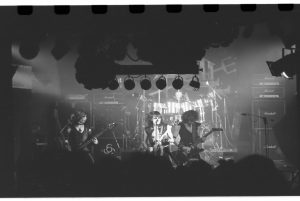 When we started Iron Fist we really wanted to focus on bands that are passionate about heavy metal and put on a show, a proper show – like Iron Maiden, King Diamond and KISS. Hell are one of the few modern bands who understand that need for theatrics and drama in a live performance, do you agree?
When we started Iron Fist we really wanted to focus on bands that are passionate about heavy metal and put on a show, a proper show – like Iron Maiden, King Diamond and KISS. Hell are one of the few modern bands who understand that need for theatrics and drama in a live performance, do you agree?
Andy: “I think people are just craving something outside the box a little bit. The genres that are current at the moment, it’s just metal by number isn’t it? The fact that a band comes along with some melody, image, everything bands were doing back in the day, that we grew up watching – there’s a whole older audience out there that are crying out for fresh music and the younger kids are into it as well – you see them at our shows these days and they love it, it’s really appealing to people across the board and any band that has got some melody is sadly lacking in today’s scene, I think.”
Kev: “We anticipated that our target audience would be 40 or 50 year old retro bangers who’d grown up on a diet of Saxon and Judas Priest… we seem to have a much broader appeal than that these days, just because we’re different to everything else out there and if you look at the stats the biggest section of our fanbase is between 18 and 25, which is a massive surprise. I don’t think they’ve ever seen a band like ourselves, putting on a show with fire and pyros and stilt walking; it’s complete entertainment and even though there’s all the history, which a small percentage of people know about, the vast majority of the metal-going public thinks we’re a new band with only one album out so if put yourself in the shoes of a festival goer, at something like Bloodstock for example, stood in a field for three days and there’s a 100 bands, the band you’re going to remember is the one with the singer on stilts with fire everywhere. By virtue of the fact that there is so much visual activity, people will stay and watch it and gradually they get into the music as well.”
Andy: “We force them to listen by plying them with fire. In the ‘80s, all the classic bands used to put on a bit of show, maybe not to the extent of what we’re trying to do but there was always anticipation for a tour coming through for months in advance and to me, with the ‘90s and 2000s, where every time a band played live it was just a bit of backline and the bands looking like they’d just got off the bus, I think people are craving entertainment.”
Kev: “We’re all children of the ‘80s really. We would go to gigs as 17, 18 or 19 year old kids, and we’d be there at De Montford Hall in Leicester to see Saxon or Judas Priest and you would anticipate it for weeks and weeks in advance, you would have sat there looking at the album covers, absorbing all the lyrics, looking at your ticket, looking at your train ticket and you’d get there and you’d walk in and there’d be the walls of Marshalls, the lighting rig and it would be an incredible show and for me, metal has lost so much of that and I think it’s a far sadder place for it. I think the other thing I would add is that the music is the most important thing, the way we’ve always looked at this is that if you’ve got a band with really good songs, and they’re playing them well and it’s being delivered with energy, the music stands up on its own two feet and the addition of a theatrical show just helps enormously.”
You had to strip your show down a lot tonight though, right?
Andy: “When you’re in a support position, it’s not your show but there’s still plenty of things you can do with a frontman like Dave [Bower]. We can make a good impact within 30 or 40 minutes.”
Kev: “Over the past few years we’ve built up this epic stage show with gargoyles and church pulpits and we’ve got our own propane gas system and every penny we’ve made since we started has gone straight back into the band but the problem we have is, like Andy said, it’s just not appropriate for us to go out there on this tour with pyrotechnics and all the rest of it, but you know it’s all part of the long term plan.”
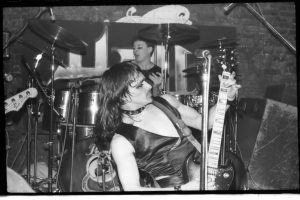 There are similarities in that respect between Hell and a band like Watain, who also pile all their money back into putting on the best live show possible, but does that limit how often and where you can play?
There are similarities in that respect between Hell and a band like Watain, who also pile all their money back into putting on the best live show possible, but does that limit how often and where you can play?
Kev: “It’s all done on a shoestring, but what the most important thing is and one of the things that has really contributed to the success is that we’ve been very selective about what we do. We’ve actually turned down more offers to play because we’re not 18 years old anymore and we know we might have a finite time left in the industry, I mean I hope we can go on for years and years, but our feet are very firmly on the ground and we know we want to be the best we can so we’re not going to play in a club in Newcastle to 300 people for 500 quid. We’re not being snobby or arrogant, we’re being sensible.”
Andy: “If you think about what Venom did in the early days, they did the same thing. They made themselves seem bigger than they ever were by creating this air of mystery by doing selective gigs.”
Kev: “The first London show Venom ever did was the Hammersmith Odeon and they promoted it to the hilt and got the likes of Geoff Barton and Sounds Magazine behind them. Forget all the little pubs that Iron Maiden had spent years schlepping around in, let’s do a huge pyro show, with a big PA and fair play.”
I would have loved to have seen Hell (and Venom for that matter) back in 1984, what were the shows like?
Kev: “We had a lighting rig and costumes – if you imagine what we’re doing now but shrunk down to the level of a room in a pub somewhere. We always wore corpse paint, even back then it was very much a show in every sense of the word.”
Andy: “It was like seeing a professional band; a top pro band in a back room of a pub. People always say to me, ‘why don’t I think the band got signed?’ and I don’t think you could fully understand those demos without seeing the band live – that’s really where they made the impact. I liked the demos because they reminded me of the live shows! No one used to come up from London to the Midlands to see bands, so they were stuck the wilderness and to do a show in London cost a fortune, so they never got out to the people that should have seen them unfortunately. It was a killer show back then and we’ve tried to take it further, even down to the choreographed moves we do on stage, even down to the tails on the waistcoats, we’ve just tried to take it a step further on all angles really.”
Kev: “Because we’d grown up watching Priest and Maiden and Saxon at these big halls, we just tried to emulate what they were doing but in a tiny room. We had our own PA and our own lighting rig, nothing fancy but every penny the band made was put back. Andy always said he was as impressed with us as he was with Iron Maiden.”
Andy: “I think I saw Hell on the Mad March Hare day in 1982 and I saw Maiden March 10, 1982 at the Derby Assembly Rooms. I’m not autistic, I’ve just got a good way with remembering dates. I was definitely as impressed. I was having a lesson with Dave [Halliday] and I didn’t even know Dave was in this band at the time. My mate John said, ‘come on, you have to come and see Dave’s band’ and I was like, ‘they’re just a bunch of poofs who wear make-up’. But I loved it.”
Kev: “Basically what you see now, even on a tour like this where we’ve only got 20 minutes, doing what we do with no props and no pyros, it’s basically just an extension of everything we did back then and to us it was just the natural thing to do. The make-up idea was from Dave Halliday’s band, Race Against Time. They were active three or four years earlier than us and were like Black Sabbath going through old unreleased Rush material, that’s the best way I can describe it. It was very progressive but very heavy and very doomy and collectively they were the best musicians for miles around, everything about them was just a cut above. And they used to come onstage wearing matching pinstripe trousers, big furry boots and black waistcoats and eyeliner. At the time I was in a band called Paralex, which was a straight-forward new wave of British heavy metal band. I’d seen Race Against Time and Dave was my hero, I modelled myself on him in a way. Finally in 1981 when I heard Race Against Time had broken up I approached him and told him I’d always admired him. We’d done some gigs together, because there was a band in Nottingham called Radium and because it was so difficult to get a gig we used to hire local leisure centres and put our own gigs on; Paralex, Race Against Time and Radium and usually one or two support bands because that was the only way you could put on a big show. We’d hire a big PA, a big lighting rig and six or seven hundred people would turn up and we’d take it in turns to headline. So long story short, Race Against Time broke up, I approached Dave and I’d already poached Tony Speakman from Paralex to play bass and we got Tim involved as a drummer and that was where Hell came from.”
Andy: “Tell them about Tony’s costume idea.”
Kev: “The name Hell was originally Tony’s idea and for years he had this idea of a band called Hell where we would all wear these red costumes and devil horns with these big polystyrene boulders all over the stage.”
Andy: “Needless to say that didn’t happen [laughs].”
Kev: “We thought it was a good name, short and sharp and to the point and I think Dave came up with the original design of the logo and we rehearsed probably a full 18 months before we did any gigs because what the band is now, everything that was done back then was done to a level of quality and we wanted to put on a whole show rather than just standing there in jeans and t-shirts. The material was mash ups between Race Against Time songs that Dave had written and because I was one of the main songwriters in Paralex, Paralex riffs. And then all of a sudden I got into keyboards as well, ‘cos at the time my favourite band was Rush and you could add so much texture and depth to a song that way. Good times, good times!”
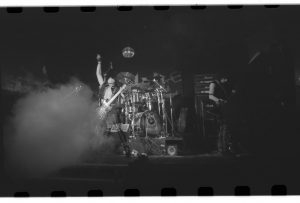 When did it all go sour?
When did it all go sour?
Kev: “Obviously the band got signed to Mausoleum and it was a culmination of everything we ever wanted and then two weeks prior to the album being recorded the label went bankrupt and it all collapsed. Now owning your own PA, your own lighting rig, it was very expensive, at the time I think I was 28 years old and something like £14,000 in debt, which in 1987 was a lot of money. The record deal folded, everybody was devastated, so I thought I’ve got to get out. I’d got no job, no home, no money, no prospects and I thought unless I really make a decision and change where I’m going in my life I’m going to be in real trouble. So, I got all the guys together and said ‘I’m really sorry guys, I just can’t do it anymore. I’m gonna stop playing, sell all my equipment, get married and do something else’. No arguments, no animosity, they all took it on the chin and said ‘we totally understand where you’re coming from’. The band carried on and hired another guitarist, but everyone knew it would never be the same again. Tim and Tony thought it would be a good idea to take the band in a more commercial, melodic direction but I think we all knew it was a spent force. Eventually the band folded altogether and there was a very strange day when I was working in a music shop and Dave showed up. He didn’t seem to have any reason to come there and he was only there for ten minutes, and I thought it was really odd. It turned out he’d been to see everyone he knew and shortly after that he took his own life. Dave lived for music and lived for the band and I still punish myself thinking if I’d stuck it out he’d still be there, but you can’t think like that. He will always be a massive part of what we do and on every single Hell album will always feature a cover of a Race Against Time song because they’re fantastic songs that deserve to be put out there but also it’s just our way of keeping his legacy alive.”
So many bands have reunited and are doing the circuits again, for Iron Fist it’s great – it’s a dream to see Vardis and Fist and Deep Machine, but Hell seem to be something ‘other’ – more than just another NWOBHM reunion, do you agree
Andy: “We never looked to be this retro band. There’s all these bands out now that, if they are from the ‘80s, they look like they’re from the ‘80s and you can tell they’re doing it because they love it, which is great, but we’ve always seen this as something moving forward. We’ve never tried to be a throwback band from the ‘80s, we wanted the quality of the songwriting from the ‘80s but move it forward with the modern times. We’ve basically picked Hell up from 1987 and dumped it in 2013.”
Kev: “That whole ‘80s retro thing, it’s something we want to be disassociated with.”
Andy: “I mean we’re not one of those bands anyway, because Hell missed that whole scene, that scene was over when Hell came out, Paralex were part of that but Hell was ‘82/’83.”
Kev: “When the reunion first became public knowledge the old tape traders were getting really excited about it and fair play to those guys, they were the guys who kept the band’s legacy going all those years but there are certain types of people that we’ve come across who, for reasons known only to themselves, don’t think an album has any merit unless it sounds like it was recorded in a basement and it’s just not us, the first album is the album we would’ve made back in ‘87 if we’d had the money and the technology and we’ve always said we want to move forward while retaining the history and the legacy [Ed: You listening, Dan Neild, you old grump!!!].”
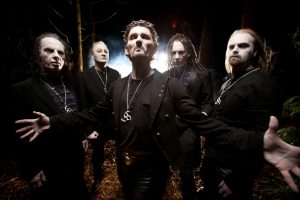 It helps having a world class producer in the band, then…
It helps having a world class producer in the band, then…
Kev: [Laughs] The whole motivation behind Hell was provided by Andy – his passion for having spent 24 years wanting to record these songs that he’d heard when he was a kid and wanting to partially honour the friendship and legacy of Dave Halliday that had set him on his formative path, but also just the fact he always felt we’d never had the break that we deserved and maybe just maybe, if we’d been in the right place at the right time something really great could have happened. And god bless him he took it upon himself to get all the old guys back together and we just started recording the first album as a hobby project really. I had to learn how to play guitar again and we’d record when Andy had any downtime in the studio. Also finding David as the figurehead was just the best thing. Originally Martin Walkyier from Sabbat was going to record vocals for us. Martin does one thing and he does it very well indeed and it just wasn’t right for this. David is my kid brother and I’ve spent 15 years watching him do all this theatrical stuff in the West End, and we needed a voiceover and I thought I’ll get Dave down to do it as we needed a big booming Richard Burton voice and there was this seminal day where he came down to do it and we were sat in the control room listening back to the voiceover he’d done, which he nailed in one take by the way, and he just started singing along to the track as obviously he’d grown up with us, he knew all these old songs, and me and Andy, we just looked at each other and thought ‘holy shit, we found the guy’. Now initially I gave Dave a very hard time, because I didn’t want to be accused of nepotism but also because Dave’s first attempts of doing this were beautifully sung, perfectly in time, perfectly in tune, but with no aggression to it. We’d had a conversation over a few beers one night and I said, ‘Look Dave, what you need to do is imagine it like an acting role. You’re a metal frontman, you really have to go for it’, and to cut a long story short he ended up re-recording all the vocals for the album, did an absolute killer job and the rest as they say is history and my opinion is, even though he’s sitting here and I love him, he is, to me, the best frontman in metal right now. I see so much Freddy Mercury in him, the humour, the quirkiness, he’s just perfect and the fact he does incredible vocals as well is just the icing on the cake. And for the second album, he’s proved himself as a brilliant lyric writer too. So all of a sudden the band has changed force when you’ve got Andy writing the music, you’ve got me doing all the film score stuff and keyboard bits, you’ve got Dave doing what he does lyrically, and this second album is really just the start of the next phase. We were talking the other day and we don’t think we’ve even near peaked. All the guys who have reviewed the second album have said it’s better than the first one and we think that we can do something even better, it’s very much a band in its ascendency.
“As to how Andy got us together, when Dave died and the band broke up in 1987 I sold all my equipment and walked away from it without a backwards glance. I just took the view that it was the best band I could ever have been in and nothing else was ever going to come close, and when you’ve done the best then everything else is going to be second best. I don’t do second best, so I walked away from it. And I did all the things that people do, I got married and I got divorced and got jobs, got fired. I had a completely shit life and then all of a sudden, in 2008, all this started to happen. I went through an absolutely awful divorce, which resulted in me losing contact with my son for about seven years and when we finally got reunited this little chubby kid that I’d seen seven years previously was now this six foot tattooed metalhead and we started getting close again so he started playing me all these albums by bands like Nevermore and Exodus and Trivium and I was looking at the CD covers one day and they’d all been produced by this Andy Sneap guy. I said to my son, ‘this guy, he was front row of every gig we ever did’ and he thought it was just dad bullshit and so he contacted Andy on some internet forum and unbeknownst to me Andy had spent a few years trying to find me and all of a sudden he’s got a kid on an internet forum with the same surname as me saying, ‘My dad reckons he knows you’ and it was ‘oh shit, we’ve found Kev at last’. We had a few beers, talked about old times and he took me to the studio as I’d always been interested in the recording side of it and within an hour he thrust this guitar into my hand and said, ‘do you still know any of the old Hell songs’ and that’s how it all started really.”
What does the future hold for Hell?
Andy: “We’re just going to keep rolling with it really. It’s weird, it reminds me of Sabbat in a way, when we did that originally everyone was behind us and we felt it just lift and lift and lift and then same thing has happened with Hell where we’ve struck a chord with people, a real positive chord and you feel the press behind you and the fans are behind you and it’s like we can’t do anything wrong at the moment. So I think we’re just gonna keep going and keep seeing where it takes us but we haven’t got any plans, apart from obviously we’d like world domination.”
Originally printed in Iron Fist #8
Copyright © 2024 Iron Fist Magazine. All Rights Reserved.